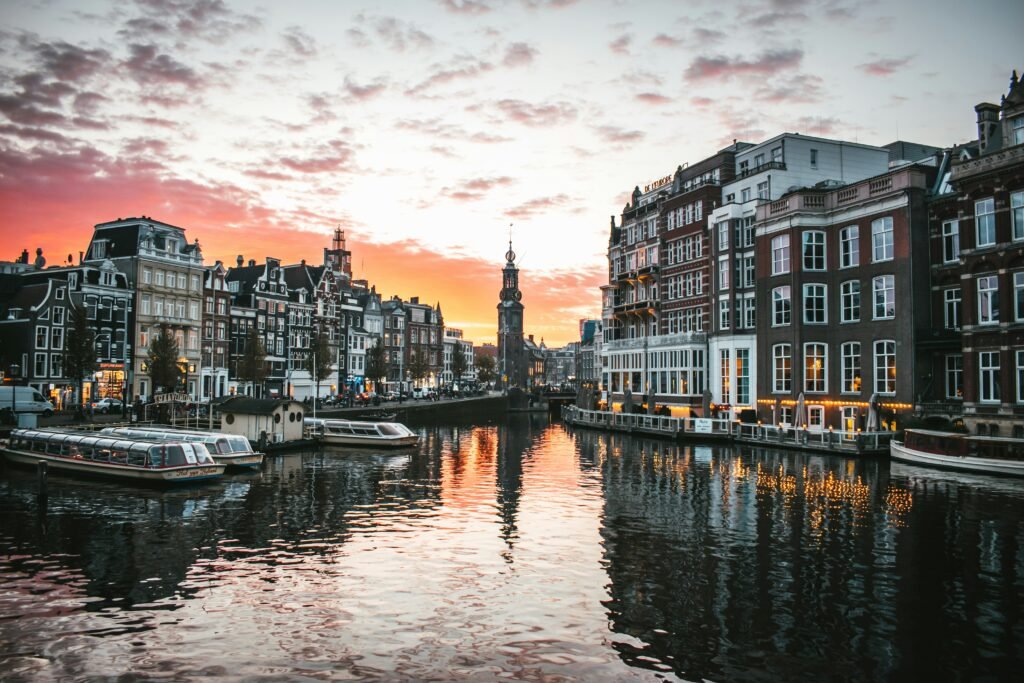🇳🇱 Preparing for a new start in the Dutch capital? This in-depth, step-by-step guide gives you the practical facts, updated procedures, and realistic cost breakdowns you’ll need for a smooth move to Amsterdam in 2025.

What Should I Know About Living in Amsterdam at a Glance?
- Flag: 🇳🇱
- Population: About 917,000 in Amsterdam municipality (mid-2025 estimate)
- Currency: Euro (EUR)
- Average Salary: Around €45,000 per year (Amsterdam city, 2025)
- Live EUR↔GBP Exchange Rates: Consult:
- Dutch Central Bureau of Statistics (CBS), last updated in June 2025: cbs.nl
- European Central Bank, last updated in July 2025: ecb.europa.eu
- XE Financial Data Team, last updated in July 2025: xe.com
Reviewed by CBS (Dutch Statistics Office), Amsterdam urban economic analysts, last updated in June 2025; European Central Bank Monetary Policy Department, last updated in July 2025; XE Financial Data Team, last updated in July 2025.
How much does it cost to move to Amsterdam from another country?
International moving costs depend on where you’re coming from, how much you ship, and the mode of transport. As of 2025, average price ranges are:
| Move Type | Delivery Time | Estimated Cost (EUR) |
| 20ft container | 2–4 weeks | €2,300 – €4,100 |
| 40ft container | 2–4 weeks | €4,200 – €6,400 |
| Air freight (1m³) | 4–7 days | €1,000 – €1,700 |
| Customs Fees | — | €120 – €350 |
Reviewed by Freightos Market Analytics Team and Maersk Logistics Research Team, last updated in July 2025.
Use a real-time moving calculator for a tailored quote with ReloAdvisor.
Real-life case:
“I moved from Toronto to Amsterdam using a 20ft container for €3,400, customs included. Shipping was to Rotterdam port and took three weeks, and a local agent’s help with Dutch invoices and inventory made customs simple.” — Tomas C.
Amsterdam is the top relocation city in the Netherlands, followed by Rotterdam, The Hague, Utrecht, and Eindhoven—all popular with expats for their dynamic cultures, jobs, and English-friendly environments.
What is the average cost of living in Amsterdam for expats?
Amsterdam is consistently ranked as the Netherlands’ most expensive city, but it offers excellent infrastructure and global amenities. In 2025, single adults usually spend:
| Expense | Monthly Cost (EUR) |
| Rent (1-bed, city center) | €1,500 – €2,400 |
| Rent (1-bed, outer districts) | €1,100 – €1,700 |
| Groceries | €270 – €420 |
| Public Transport (GVB) | €95 – €120 |
| Utilities (electric/gas/water) | €130 – €210 |
Reviewed by Numbeo Amsterdam Cost of Living Research Team, last updated in June 2024.
Dining out in a local café costs €18–30 per meal. Monthly gym fees are usually €30–€60, and internet/mobile bundles cost €30–50. A public transport subscription covers trams, metro, and buses, but cycling is the most popular way to get around for both locals and newcomers.
For families, international schools cost €4,000–€20,000 per year, but Dutch public schools are free and often have international classes. Parking is challenging in the city center, and car-owning expats pay high monthly rates for private garages and city permits.
How do I get a visa or residence permit to move to Amsterdam?
EU/EEA/Swiss citizens can move freely—simply register with the Amsterdam municipality (Gemeente). Non-EU/EEA residents usually need an entry visa (“MVV”) and Dutch residence permit. Permit types include highly skilled migrant (“kennismigrant”), student, family reunion, or entrepreneur/self-employed.
Typical steps:
- Apply for a “MVV” (provisional residence visa) at the Dutch embassy in your home country.
- Gather documents: Valid passport, job/study contract, proof of income, Dutch health insurance, rental address in Amsterdam.
- After approval, arrive and register promptly at the local Gemeente to obtain your BSN (citizen service number).
- Pick up your official residence permit at the IND (Immigration & Naturalization Service).
- Permits are initially valid 1–5 years, renewable with ongoing proof of employment or study.
Non-EU/EEA applications can take one to four months, so plan ahead.
Reviewed by Dutch IND Immigration Policy team and Amsterdam City Immigration Service, last updated in July 2025.
How do I access healthcare in Amsterdam as a new resident?
Signing up for Dutch basic health insurance (“basisverzekering”) is not optional—it’s required for all people living in the Netherlands for more than four months. The average basic premium in 2025 ranges from €135 to €155 per adult per month, and deductibles are €385/year. You must enroll as soon as you receive your BSN. Use insurance comparison tools such as Zorgwijzer or Independer to choose your provider.
Family policies for children are free with a parent’s plan. Most expats add optional insurance (for dental care, physio, vision, etc.) for an extra €20–€40/month.
Reviewed by Zorginstituut Nederland, last updated in January 2025.
Amsterdam healthcare is renowned for accessibility and English-speaking staff, especially at international clinics.
Real-life case:
“I registered at the Zuid district hall, got my BSN, then picked a health insurer online. My €146/month rate covers GP and hospital care, and extra dental reimburses up to 80%. Access was smooth—appointments are easy to book.” — Sophie V.
How do I find rental housing or an apartment in Amsterdam?
Renting in Amsterdam is extremely competitive. Many apartments are listed on Pararius, Funda, or through agency websites. Landlords and agencies usually request:
- Recent payslips or proof of income
- Copy of your residence permit/visa and passport
- One to two months’ rent as deposit and the first month’s rent up front
- An employer’s letter or personal references
Most Amsterdam rentals are unfurnished (“kaal”); even kitchen appliances and flooring may be missing. Furnished housing is common in the expat-friendly rental market but comes at a price premium.
The most desired neighborhoods are De Pijp, Jordaan, Oud-West, and Plantage, all with excellent amenities and public transport. To save, look at up-and-coming areas like Amsterdam Noord, Slotervaart, and Zuidoost.
Reviewed by Amsterdam Real Estate Association (NVM), last updated in January 2025.

How much tax will I pay working and living in Amsterdam?
Income tax is progressive—up to 49.5% for high incomes. Most employees have tax withheld monthly, but self-employed must submit annual returns. Amsterdam levies local municipal taxes (waste collection, water board) and homeowners pay property tax. Some foreign employees benefit from the 30% ruling—an expat tax exemption over five years if eligible.
Tax filing is done online each spring; friendly English resources are available, and Dutch “belastingconsulenten” (tax consultants) can help with first-year returns.
Reviewed by Dutch Belastingdienst (Tax Authority), last updated in February 2025.
What is the customs process for shipping my belongings to Amsterdam?
Moving from outside the EU? Submit a “relocation goods” form and attach a full inventory of used goods (owned for over six months). Goods for personal use—furniture, clothes, books, and electronics—generally clear duty-free with proof that you’re starting a new main residence. Customs pre-approval is best; Rotterdam and Amsterdam (IJmuiden) are major entry points. New, still-in-box goods, or items in bulk, may be taxed at entry.
Reviewed by Dutch Customs (Douane), last updated in February 2025.
Can I bring my pet to Amsterdam, and what paperwork do I need?
All dogs, cats, and ferrets entering the Netherlands must be microchipped, rabies-vaccinated, and have a valid EU Pet Passport or government health certificate. If you’re coming from outside the EU, use an approved entry airport or port and check if additional blood tests are needed (e.g., for certain countries). Advance coordination with your airline and the NVWA simplifies the process.
Reviewed by NVWA (Netherlands Food & Consumer Product Safety Authority), last updated in April 2025.
How do I get a Dutch driving licence and register/import a car in Amsterdam?
EU/EEA licences are accepted in the Netherlands, but most non-EU licences are only valid for 185 days after arrival. If staying longer, apply to swap your licence at the municipality (“Gemeente”) and sometimes take a health check. Imported vehicles must pass a technical inspection and be registered with the RDW. The BPM environmental tax applies to almost all non-EU vehicle imports. Within central Amsterdam, parking permits are limited and expensive; many expats use bikes, trams, and buses for daily commuting.
Reviewed by RDW (Dutch Road Authority) and Ministry of Infrastructure, last updated in May 2025.

How do I open a Dutch bank account and get a BSN in Amsterdam?
Simply bring your passport, proof of Amsterdam address, and Dutch residence permit/visa to any of the main banks (ING, ABN AMRO, Rabobank, Bunq). Your civic number (“BSN”) is issued when you register at Gemeente Amsterdam and is required for employment, tax, contracts, and insurance.
Reviewed by Dutch Banking Association & IND, last updated in March 2025.
Where can I find tools and more resources before moving?
For further guidance, make use of the volume calculator, book a video survey, or explore comprehensive guides for France and Austria with ReloAdvisor.



